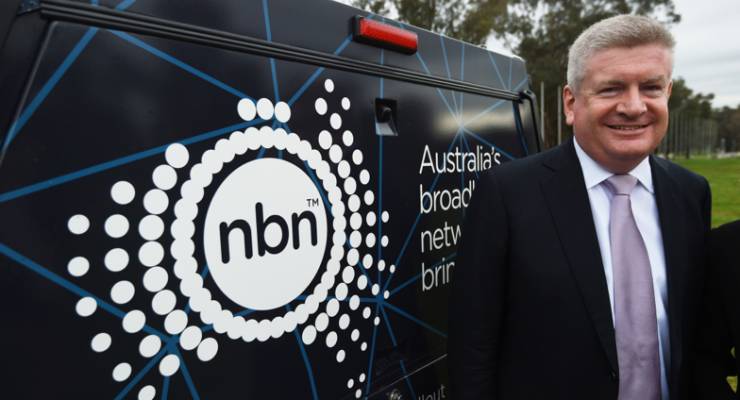
The government’s decision to make people in suburban areas pay a tax so people in regional areas can have the NBN is likely a signal that it is preparing to sell the network.
In an obscure announcement released on Monday afternoon, the government released draft legislation for what it is calling a “regional broadband scheme”, but what is effectively a tax on city broadband networks that will cost the average customer about $7 per month.
For almost as long as the internet has existed in this country — when Malcolm Turnbull “practically invented” it — there has been some recognition from government that access to the internet costs more in rural areas, and that cost should be subsidised.
When the NBN was first planned, the then-Labor government attempted to fix this problem by instigating what was called a “level playing field”. The idea was that the cost for NBN services would be the same in the cities as in regional and remote areas. The cost for offering services on fibre in the city is much cheaper than wireless and satellite in the country, but the pricing was set at a rate where people in the city would be effectively subsidising those in regional areas by paying the same higher rate across the board.
Given NBN Co was planned to be a fixed-line monopoly, in theory, this model was a sound way to ensure that people in regional areas were no worse off.
Companies that wanted to build out their own fibre networks in competition with the NBN would have to offer services on the same terms as NBN Co, including that higher wholesale price.
But the government did not predict the appetite companies like TPG would have for swooping in lucrative city areas and quickly upgrading apartment blocks with fibre to the basement while NBN Co dawdled with its own rollout, focusing on regional areas over the city.
This presented something of an existential threat to the subsidy model. When the Coalition was elected in 2013 and Turnbull was the communications minister, in addition to changing the technology used for fixed networks, he also changed the wholesale price to a “cap” and allowed NBN Co to begin aggressively responding to TPG and others by building out networks in CBD locations. The cap now means that when a company is able to offer a wholesale price lower than NBN Co’s, NBN Co is allowed to meet it.
The government considered a range of options to pay for the cost of providing fixed wireless services, and in a review the Bureau of Communications Research found in March this year that a tax on fixed-line providers offering NBN services would be the best way to go about it.
The tax is across the board, and includes NBN Co, which means that at least the first few years NBN Co will mostly be paying itself, but the tax is expected to raise about $40 million per year from private companies, costing the average consumer $7 per month.
The government has said NBN Co would be expected to reduce its wholesale price, so that customers on the NBN won’t be paying more. Consumers on a non-NBN network — like TPG’s fibre — could potentially pay more.
[Essential: it’s agreed — NBN officially a dud]
By including NBN Co in this new subsidy model, however, the government has forecast its long-term plans for the network. Turnbull has always said that it would be some time before NBN Co could be privatised, joking it could be something for the second term of Wyatt Roy’s prime ministership, but by structuring it this way, NBN Co could potentially be split into two companies — one for wireless and satellite, and one for the fixed network.
Infrastructure Australia has already recommended this as a way to privatise the network in the medium term.
Under the new subsidy scheme proposed, the government could retain ownership of the wireless and satellite networks (the unprofitable section serving regional areas) and sell the city-based NBN Co. A tax on city NBN Co customers would help the government cover costs for regional areas.
The other sign this is on the cards is in the way the government decided to loan NBN the remaining $19.5 billion it needed to complete the NBN rollout rather than just making up the funding as more equity in the NBN. Treating NBN Co as a commercial $29.5 billion company with a commercial loan from the government puts it in a better position to privatise the NBN in the near term rather than waiting for the NBN to be finished and paying down the total $50 billion network.
It wouldn’t be surprising if the government announced as soon as the next budget plans for the split and privatisation of the NBN. The Coalition has always been of the view that a government-owned telecommunications company was the wrong way to go about broadband policy, so it is likely they want the network off the books as quickly as possible.








Crikey is committed to hosting lively discussions. Help us keep the conversation useful, interesting and welcoming. We aim to publish comments quickly in the interest of promoting robust conversation, but we’re a small team and we deploy filters to protect against legal risk. Occasionally your comment may be held up while we review, but we’re working as fast as we can to keep the conversation rolling.
The Crikey comment section is members-only content. Please subscribe to leave a comment.
The Crikey comment section is members-only content. Please login to leave a comment.